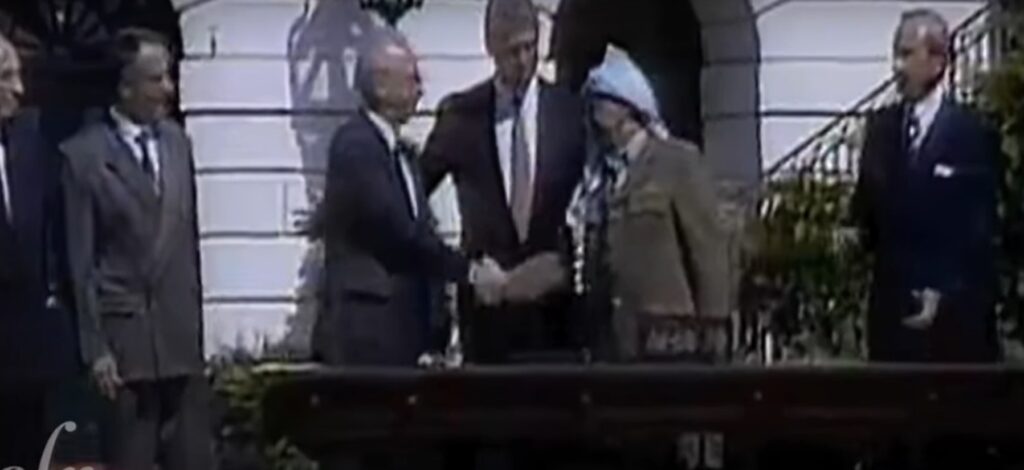As we reflect on the thirty-year period since the signing of the Oslo Accords in September 1993 at the White House, it becomes apparent that while the accord aimed to establish a path towards an independent Palestinian state, the leadership of Yasser Arafat and later Mahmoud Abbas failed to put a halt to acts of terrorism directed at Israel.
This realization prompted successive Israeli governments to view the Oslo agreement as a “Trojan horse” that inadvertently facilitated the movement of armed PLO terrorists into Judea, Samaria, and the Gaza Strip.
Regrettably, Arafat’s approach towards counterterrorism efforts was inadequate.
His tactic of releasing terrorists and permitting groups like Hamas and Islamic Jihad to carry out suicide attacks against Israel further destabilized the situation.
The Camp David summit of 2000 marked a critical turning point, as Arafat’s outright rejection of Israel’s proposals and President Clinton’s plan led to armed conflict and his eventual death in 2004.
Despite continued waves of terrorism and subsequent unrest, the PA, now under the leadership of Mahmoud Abbas, has managed to sustain its position.
The PA’s complex role of providing financial support to terrorists’ families while coordinating security measures with Israel has created a delicate balance.
However, recent events, such as the “Guardian of the Walls” operation in May 2021, have revealed vulnerabilities in the PA’s security control in certain regions, accompanied by internal struggles and economic hardships.
Despite the undeniable shortcomings of the Oslo Accords, neither the PLO nor Israel’s leadership has taken the step of officially terminating the agreement.
Instead, it persists, with the Israeli Defense Forces (IDF) acting as a protective barrier for the PA in Judea and Samaria, preventing a scenario similar to the Hamas takeover of the Gaza Strip in 2007.
Israel’s right-wing government has also chosen to maintain the PA’s authority, recognizing its strategic significance in the broader fight against terrorism.
Prime Minister Netanyahu emphasized the PA’s role as a crucial asset in this regard.
Numerous international players, including the United States, the European Union, Egypt, Jordan, and other moderate Arab nations, share concerns about the potential collapse of the PA. They fear that such an event could lead to security chaos and provide an opportunity for terrorist organizations to exploit the situation, ultimately destabilizing the region and bolstering Iran’s influence.
Central to the Oslo Accords’ importance from Israel’s perspective is the aspect of security coordination with the PA.
This element remains intact and beneficial for both parties, even though Mahmoud Abbas has occasionally threatened to suspend it.
The PA leadership is well aware that crossing this “red line” could have severe consequences for their relationship with Israel.
Recently, new armed terrorist groups, supported by Iran, have emerged in northern Samaria, presenting a significant challenge to the PA’s rule. These groups engage in terrorist activities against Israel while also undermining the authority of the PA leadership.
Internal conflicts and the struggle for succession among senior Fatah movement leaders have further weakened the PA’s effectiveness.
Mahmoud Abbas’s advanced age and his failure to achieve national reconciliation have contributed to the erosion of the PA’s legitimacy.
In light of these circumstances, it’s imperative for Israel to hold Hamas accountable for its ongoing terrorist activities from the Gaza Strip and to propose a viable political framework that could reignite negotiations between Israelis and Palestinians.
The transformation of the Gaza Strip into a hub of Islamic extremism following Israel’s withdrawal underscores the complexities of establishing an independent Palestinian state in Judea and Samaria.
As the past thirty years have demonstrated, the most pragmatic approach lies in offering the Palestinians a comprehensive interim arrangement. This solution could entail expanded autonomy within a framework that prioritizes security control, with Israel assuming a central role.
Despite the evident failure of the Oslo Accords, the value of security coordination between Israel and the PA cannot be underestimated. As both entities navigate this complex landscape, safeguarding this aspect of their relationship remains vital.




